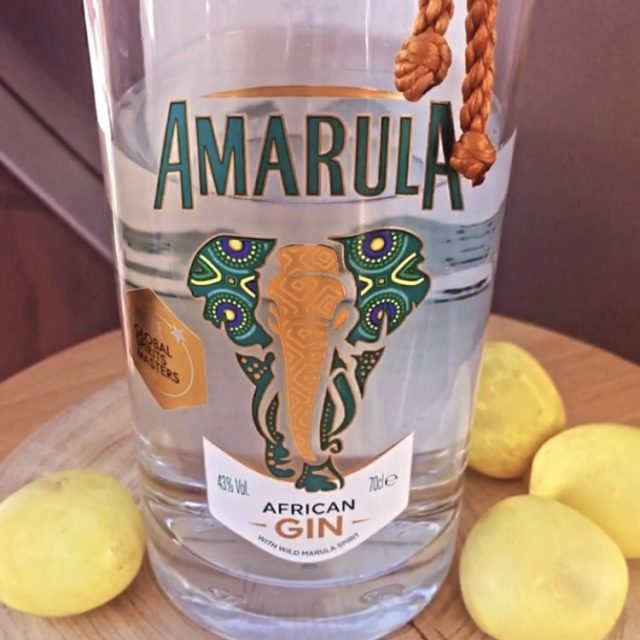This website uses cookies so that we can provide you with the best user experience possible. Cookie information is stored in your browser and performs functions such as recognising you when you return to our website and helping our team to understand which sections of the website you find most interesting and useful.
Distell launches Amarula Gin using ‘nostalgic’ African botanicals
Distell has launched a gin under its Amarula brand using wild, hand-harvested marula fruit as a key botanical.

The 43% ABV gin, named Amarula African Gin, uses marula fruits, juniper, orange blossom and Ghanaian grains of paradise to give it its trademark flavour.
The news follows the company releasing a vegan variant of its cream liqueur named Amarula Vegan that tapped into the trend for non-dairy and plant-based preferences for drinks.
Speaking to the drinks business, Rachel Hawes, head of marketing – global travel retail at Distell, said: “Amarula obviously is a South African brand that started in 1983 as a liqueur and moved into being a cream liqueur in 1989. For many years, we were a single SKU and just one product and in the ‘90s we went into international distribution and now we have a footprint in over 100 countries worldwide.”
Hawes explained that the history of the brand has helped it move towards a more exciting future, where brand awareness is high, but building excitement with new consumers has also become crucial. She stated: “We have gone from being one SKU for 30 years to now moving into very much an innovation stage. The reason we’ve moved into innovation at break-neck speed is because bringing new consumers to our brand is really important.”
She revealed: “I think, with the cream liqueur category, you kind of sit in a slightly older bracket – aged 25 and above and what happens is your brand starts to stagnate in that territory. So, by bringing in flavours – we ventured into Amarilla Vanilla Spice in 2018 and then followed that by rose, chocolate and Baobab – what we saw was that we started to talk to new consumers that we hadn’t talked to before and sometimes actually for different drinking occasions and for lots of different reasons.”
Hawes highlighted how the “journey into flavour” has helped grow Amarula, which also recently launched a vegan variant last year that is outstripping expectations. She explained: “We don’t want to forget Amarula Vegan just because it was launched last year either. The brand is in growth again on a global level and some markets are stronger than others, but our innovation journey is really reigniting Amarula and bringing new consumers in”.
The move into flavours for Distell with Amarula is also showing the company that it can broaden its reach – not just across demographics, but also across different calendar occasions and situations.
Speaking of this revelation, Charmelle Conning, global brand lead at Amarula told db: “What we’ve seen with our flavours is that it’s actually de-seasonalising the brand. For example, Raspberry Chocolate Baobab has more appeal during summer, whereas Vanilla Spice is seen as a very kind of festive serve.
Conning said that the turning point came for the brand when Distell asked a few pertinent questions about its positioning and how it saw itself versus its potential. She said: “We had to ask ourselves a question: ‘Are we a cream liqueur brand, or are we a marula fruit brand?’ The answer was that ‘we’re a marula fruit brand’ and so what makes this gin so unique is that it is the only gin in the world that’s actually been distilled from marula fruit.”
Conning pointed out how many “other gins are made from a grain-based spirit” but described how Distell has “actually developed the base spirit for the gin from the marula fruit in a similar way to Amarula – we just don’t put Amarula cream in here and we don’t put it into French oak for two years”.
In terms of taste, nose and flavour profile in general, she identified how “the fruit actually has quite a zesty sweet and sour, citrusy flavour to it and it’s very high in vitamin C and antioxidants” and explained: “When we developed the gin, we paired it with orange blossom and peel that really bring out those citrus notes of the marula fruit. It also has a very tropical flavour to it which can be best described as a combination between guava and melon.”
Conning said: “Sometimes I describe it as a nuttiness on the nose. But, for me, it’s earthiness, which probably isn’t the best way to describe the gin. But, coming from Africa, that beautiful African earth smell is quite nostalgic.”
According to Conning, the marula fruit is paired with Ghanaian grains of paradise because “it is quite popular in African cooking” and you “can definitely smell the marula earthiness or nuttiness coming through, which is very refreshing and a very easy-drinking smooth gin”.
For every litre of the gin sold, Distell donates a pound in the UK or a euro in the rest of Europe to the Amarula Trust as its charitable arm. It also reinvests back into the marula fruit ecosystem, as well as elephant conservation strengthening communities – the community that actually harvests the fruit. The tassels on each bottle are also made by a black empowered female charity in South Africa where women have been given employment to make them. Conning added: “They make about 12 million tassels per year for Amarula, so it’s a significant business for them.”

